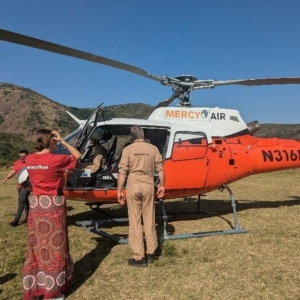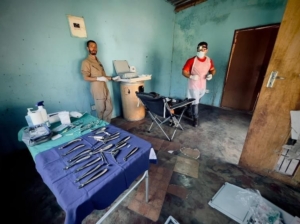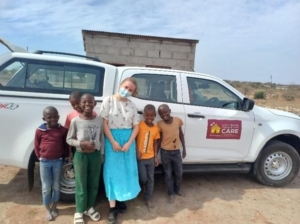Eswatani, Sophie Clarke, Summer 2024
Sophie Clarke
My name is Sophie, and I am a fourth-year medical student in Sheffield. I went to Eswatini (a nation bordering South Africa and Mozambique) through Medical Missions Eswatini (MME) for my elective this summer. This involved two weeks in ophthalmology and two weeks with community outreach teams. Combining mission with medicine was important for me in my elective, and my time with MME allowed me to achieve both.
MME was founded by a team including ophthalmologist Dr Jonathon Pons with the mission of John 10:10, ‘Helping neglected communities find health & fullness of life’. Thanks to his input, Ophthalmology care has flourished in Eswatini. Using the operating room for two patients at a time, 20-plus procedures are possible in a day, including cataract, pterygium and strabismus surgeries. My highlight was seeing a smiling elderly lady who regained sight following an operation, and no translation was needed; it was clear that this had changed her life and the lives of those supporting her.

Mercy Air is a Christian organisation that was created to reach isolated areas by helicopter and plane to facilitate spiritual and physical relief. They have been regularly involved in Eswatini, and while I was there, they received a helicopter to be based permanently in Eswatini, and I was invited to participate in its inaugural outreach mission to a community only accessible by foot, motorbike or air. It had been over a year since Mercy Air had last visited this community, and needs varied greatly. Seventeen patients had teeth removed in a dentist surgery that minutes before had been a marijuana store. The community grows this to sell to gangs from Mozambique for a fraction of the street value. Receiving an injection is seen as a cure for multiple problems so patients were requesting a shot from the GP without any specific symptoms. One patient was acutely unwell with suspected pyelonephritis; however, he refused to be airlifted to the nearest hospital with full understanding that his condition was unlikely to improve. We ran out of paracetamol, NSAIDs and antibiotics over the morning, and by mid-afternoon, all patients had been seen. When a problem required further investigation, patients were advised to trek to the hospital, a day’s walk away.

Practising palliative care when the strongest pain medicine that you have is tramadol (and even that is often out of stock) requires a completely different approach to the UK. Eswatini is lacking in oncological treatments, so a cancer diagnosis is often terminal. I saw fungating male and female genital cancers the size of footballs. Western medicine is prescribed with the honest opinion that it will not cure the problem but manage the symptoms, but it is commonly rejected by patients as traditional indigenous medicines promise a cure. Apart from basic observations and medications, empathy, community, and spiritual support are the tools which the community and palliative care team use to manage patients. Singing hymns with patients’ families was common, and we would spend time playing with children, reading scripture passages, and eating with families. Visits and support for families continue following a patient’s death. Also, amazingly, I did meet a patient who had received treatment for breast cancer in South Africa and had been discharged from palliative care! My time with this team reminded me of Mark 2:1-5 when Jesus heals us spiritually before our physical needs.

My time in Eswatini has impacted my walk with the Lord and renewed my enthusiasm for my medical career. Thank you for all your prayers and support, and I am excited to see what God’s plan is for me in the future!

Sophie’s Elective was supported by Medical Missionary News


Leave a Reply
Want to join the discussion?Feel free to contribute!